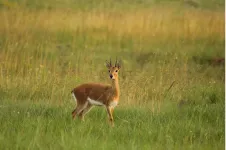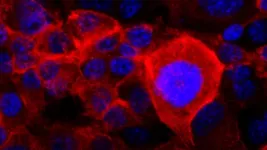(Press-News.org) If only it were as simple as finding more grassland for an antelope.
The story of efforts to conserve the endangered oribi in South Africa represent a diaspora of issues as varied as the people who live there. On its surface, like many threatened species, you have conflict between a need for habitat and private landownership.
But dig a little deeper and you'll uncover a seedy underbelly of political corruption, gambling, struggles over land, and racial tensions. No matter how much success is made through more traditional conservation efforts, says a new study by a University of Georgia researcher, the species will continue to be threatened until the human conflicts can be mitigated or resolved.
"It's an interesting case study because the oribi is so dependent on habitat that's on private lands," said Elizabeth Pienaar, an associate professor at the University of Georgia Warnell School of Forestry and Natural Resources. "But it's also a species that has gotten trapped in much larger political and social conflicts. ... This is the dark side of conservation. We can say, look, the species needs X, Y and Z to survive and recover, but in cases like this, conservation efforts are mired in a complex political, social and historical framework. These much larger issues remain unresolved."
For the oribi (OR-uh-bee), said Pienaar, solutions start with access to native grassland that has rapidly disappeared on the South African landscape. This means education for farmers who own land where oribi graze, but quickly scales up to include enforcement to prevent illegal poaching and even de-escalation of racial tensions during a time when land reform (the return of white-owned farmland to Black residents) is causing considerable conflict.
Meeting with farmers can help
Threatened or endangered species in other parts of the world face different issues, but the success of their conservation is likely tied up in socio-political webs, said Pienaar. The study, published recently in the journal Endangered Species Research, is the first of two parts that aim to provide insights for conservation agencies and organizations navigating similar waters. It was co-authored by master's student Adrienne Louw and professor Adrian Shrader of the University of Pretoria.
Often, landowners want to conserve species because it's part of their cultural heritage or because they care about wildlife and land stewardship. But a misunderstanding of the animals' needs, a lack of outreach from government agencies due to budget constraints and a general mistrust of the government stemming from years of political conflict and corruption work against even the most basic education and outreach efforts.
"The farmers don't want to be told what to do, but you can give them advice and they will implement it as they see fit," added Pienaar. "That could be one of the most impactful things: somebody who is seen as a neutral third party going out there and just meeting with them. And the farmer will try a few things and if it doesn't affect their profit margin, they'll do it. That's what they're looking for--some advice."
Separately, said Pienaar, local communities require employment and food security to reduce the need for illegal hunting. Poverty is a serious problem in South Africa, where 65.4% of the population lives below the poverty line, and infrastructure and service delivery in rural areas is poor. Improved economic and social security, including options to purchase meat at affordable prices, may reduce conflicts and poaching pressures. But poverty extends beyond financial insecurity, she added. Poverty is a lack of voice, an inability to define one's future.
In addition, communities resent the loss of their traditional hunting rights under neocolonial management of wildlife. Poaching becomes a means of political protest against landowners and the government, particularly if the government is perceived to have failed communities by not providing needed services.
Underground gambling rings exacerbate the issue
These solutions only address a portion of the problem, though. Improving access to habitat and community services won't stop a serious threat to oribi: illegal hunting at night, with trained greyhounds and hunting dogs, which sustains underground gambling rings.
Called "taxi hunting," greyhound owners--who have the income or wealth to purchase these expensive hunting dogs--arrive at the edge of a farm under cover of night. The dogs, trained to run and capture the small antelopes, are fast and silent. Whoever's dog catches the oribi wins the pot of money, as does the dog that kills the most antelope.
If a farm owner can't stop the taxi hunt before the dogs are released, they are almost powerless to prevent it. It's illegal for them to shoot a hunting dog that is with its handler, even if it's on the farmer's land. And if they do, there could be retribution in the form of arson, property damage or arrest of the farmer for shooting the dogs.
Then, add race into the mix: Farm owners are white, while the taxi hunters are black. "So, the farmers feel threatened because not only is there a push for land reform, but they are dealing with increased rural crime while also trying to prevent poaching by people who are not at risk of poverty," said Pienaar. "It's not just about protecting the oribi. It's about protecting their family's safety, their property and their heritage."
And then there's the oribi, stuck in the middle.
"But it's not just the oribi. The oribi is a case study that is consistent with other species at risk, like rhinos and pangolins," said Pienaar. "Biologists and ecologists are fantastic in terms of what these species need in terms of habitat or maintaining viable populations. But if you cannot resolve larger socio-political conflicts, the animal is still at risk. Most conservation issues, that I'm aware of, are about people and the pressures they face."
INFORMATION:
Rutgers scientists have used a diagnostic technique for the first time in the opioid addiction field that they believe has the potential to determine which opioid-addicted patients are more likely to relapse.
Using an algorithm that looks for patterns in brain structure and functional connectivity, researchers were able to distinguish prescription opioid users from healthy participants. If treatment is successful, their brains will resemble the brain of someone not addicted to opioids.
"People can say one thing, but brain patterns do not lie," said Suchismita Ray, lead researcher and an associate professor in the Department of Health Informatics at Rutgers School of Health Professions. "The brain patterns that ...
Cancer cells can become resistant to treatments through adaptation, making them notoriously tricky to defeat and highly lethal. Cold Spring Harbor Laboratory (CSHL) Cancer Center Director David Tuveson and his team investigated the basis of "adaptive resistance" common to pancreatic cancer. They discovered one of the backups to which these cells switch when confronted with cancer-killing drugs.
KRAS is a gene that drives cell division. Most pancreatic cancers have a mutation in the KRAS protein, causing uncontrolled growth. But, drugs that shut off mutant KRAS do not stop the proliferation. ...
Lifestyle changes for demand-side climate change mitigation is gaining more and more importance and attention. A new IIASA-led study set out to understand the full potential of behavior change and what drives such changes in people's choices across the world using data from almost two billion Facebook profiles.
Modern consumption patterns, and especially livestock production in the agricultural sector to sustain the world's growing appetite for animal products, are contributing to and speeding the advance of interconnected issues like climate change, air pollution, and biodiversity ...
Imagine flexible surgical instruments that can twist and turn in all directions like miniature octopus arms, or how about large and powerful robot tentacles that can work closely and safely with human workers on production lines. A new generation of robotic tools are beginning to be realized thanks to a combination of strong 'muscles' and sensitive 'nerves' created from smart polymeric materials. A research team led by the smart materials experts Professor Stefan Seelecke and Junior Professor Gianluca Rizzello at Saarland University is exploring fundamental aspects of this exciting field of soft robotics.
In the factory of ...
As well as bright colours and subtle scents, flowers possess many invisible ways of attracting their pollinators, and a new study shows that bumblebees may use the humidity of a flower to tell them about the presence of nectar, according to scientists at the Universities of Bristol and Exeter.
This new research has shown that bumblebees are able to accurately detect and choose between flowers that have different levels of humidity next to the surface of the flower.
The study, published this week in the Journal of Experimental Biology, showed that bees could be trained to differentiate between two types of artificial flower with different levels of humidity, if only one of the types of flower provided the bee with a reward of sugar water.
To make sure that the artificial flowers ...
Augmented reality (AR) is poised to revolutionise the way people complete essential everyday tasks, yet older adults - who have much to gain from the technology - will be excluded from using it unless more thought goes into designing software that makes sense to them.
The danger of older adults falling through the gaps has been highlighted by research carried out by scientists at the University of Bath in the UK in collaboration with designers from the Bath-based charity Designability. A paper describing their work has received an honourable mention at this year's Human Computer Interaction Conference (CHI2021) - the world's largest conference of its kind.
The ...
According to a recent study, open learning spaces are not directly associated with the physical activity of students in grades 3 and 5, even though more breaks from sedentary time were observed in open learning spaces compared to conventional classrooms.
The findings are based on the CHIPASE study, carried out at the Faculty of Sport and Health Science of the University of Jyväskylä. The results were published in Frontiers of Sports and Active Life.
After the reform of the national core curriculum for basic education in Finland, issued in 2016, most of the new or renovated comprehensive schools in Finland began to incorporate ...
The way in which a compound inspired by nature produces hydrogen has now been described in detail for the first time by an international research team from the University of Jena, Germany and the University of Milan-Bicocca, Italy. These findings are the foundation for the energy-efficient production of hydrogen as a sustainable energy source.
Nature as a model
There are naturally occurring microorganisms that produce hydrogen, using special enzymes called hydrogenases. "What is special about hydrogenases is that they generate hydrogen catalytically. Unlike electrolysis, which ...
The relationship between personality, genes and chronotype (sleep patterns) has been studied by researchers at the University of Warwick and the University of Tartu, Estonia
People high in Conscientiousness and low in Openness are rather morning people; lower-level personality traits such as self-discipline, excitement-seeking, and straightforwardness have also been linked to chronotype
It is partly due to genetic factors, but there is scope to change your sleep patterns if you wanted to become a morning person but are currently an evening person for example
The link between the different hierarchies of personality, sleep patterns and even genetics has been discovered by ...
Coastal wetlands like seagrass meadows, mangroves, and salt marshes play vital roles along the shoreline, from providing a buffer against storm surges, to providing critical habitat for animals, to capturing atmospheric carbon.
We are still just beginning to comprehend the intricate workings of these highly productive ecosystems and their role in mitigating the climate crisis, but UConn researchers are one step closer to understanding how salt marsh vegetation, their bacterial communities, and vegetation can help predict a marsh's potential to be a blue carbon reservoir. The research was recently published in the journal Estuaries and Coasts.
"Coastal marshes are increasingly recognized as important ecosystems because they sequester and store a lot of carbon. There is ...




